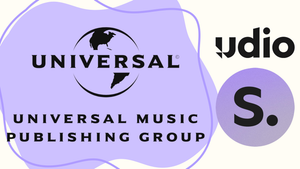Universal Music has ended its legal battle with AI company Udio and announced a licensing deal that will enable an “AI-powered music creation platform” which, both companies say, will “provide further revenue opportunities for UMG artists and songwriters”.
As a result of the deal, Udio is evolving its business model, while putting some restrictions on its existing service in the short term. The plan is to then launch something brand new next year which will allow users to “customise, stream and share music” in a “licensed and protected environment”. Should anyone want to do that, of course.
Udio CEO Andrew Sanchez “couldn’t be more THRILLED” about his Universal deal. This moment, he says, “brings to life everything we’ve been building toward”, adding “we’re building the technological and business landscape that will fundamentally expand what’s possible in music creation and engagement”.
Universal boss Lucian Grainge says he “looks forward to working with Andrew, who shares our belief that, together, we can foster a healthy commercial AI ecosystem in which artists, songwriters, music companies and technology companies can all flourish and create incredible experiences for fans”.
The Udio settlement and deal is one of two big AI announcements to come out of Universal in the last 24 hours. It has also announced an alliance with Stability AI to develop “the next generation of music creation tools”, which will involve working closely with the major and its artists “to research artist needs and technical approaches”, and to “explore new recording and composition concepts”.
Both deals are confirmation that - while plenty of litigation continues between copyright owners and AI companies, including lawsuits involving Universal - we are now moving into an era of big AI licensing deals. And while the wider music community is more or less aligned on the copyright obligations of the AI companies, as these deals are done divisions will emerge within the community.
We already knew the majors were in licensing talks with Udio and its rival Suno while also pursuing litigation against both start-ups. Both AI companies remain bullish in their court filings. However, with ongoing legal uncertainties - and the risk of losing the lawsuits and being forced to pay billions in statutory damages - it was clear speedy settlements and licensing deals would be a more desirable outcome.
The music community has been pretty much united in slamming Udio and Suno for launching generative AI models trained on unlicensed music, both having seemingly curated training datasets by scraping music off YouTube without the permission of creators or rightsholders, or - indeed - YouTube.
However, as Universal - and Sony Music and Warner Music - start to do licensing deals with Udio, Suno and others, the big question is this: can record labels and music publishers unilaterally opt all their artists and songwriters, and their recordings and songs, into those deals? Or do they need specific music creator consent?
Grainge recently told Universal staff in a memo that the company would seek specific consent from artists if their voices are imitated in an AI-generated output, and from songwriters when AI generates new songs that incorporate elements of existing songs.
Both of those will likely apply to the new Udio product, which it’s thought will include voice-swapping and mash-up tools. And in an interview with Billboard, Sanchez is keen to talk about artists opting-in.
However, the majors have so far resisted calls to secure explicit consent when licensing the general training of AI models. And - as is usually the way with the music industry’s big digital deals - there is very little transparency about how revenues will be shared, between the recording rights and the song rights, between each individual recording and song, and between labels and artists.
Of course, as those debates within the industry inevitably become more heated, there remains the litigation side to all this too. That is far from over.
Both Sony and Warner are still suing Udio, while all three majors continue to pursue their lawsuit against Suno. And even if all three majors ultimately settle both lawsuits and sign licensing deals covering both their recording and song catalogues, that’s not the end of legal battles.
Independent musicians have separately sued both AI companies in the US, while in Continental Europe - on the songs side - it’s generally the collecting societies, not the publishers, that control the relevant rights. And German society GEMA is currently suing Suno.
So expect a lot more disputes, both within the industry and in the courtroom, even while Udio and Stability get busy building their respective - and at least partially licensed - AI-powered music creation tools.

